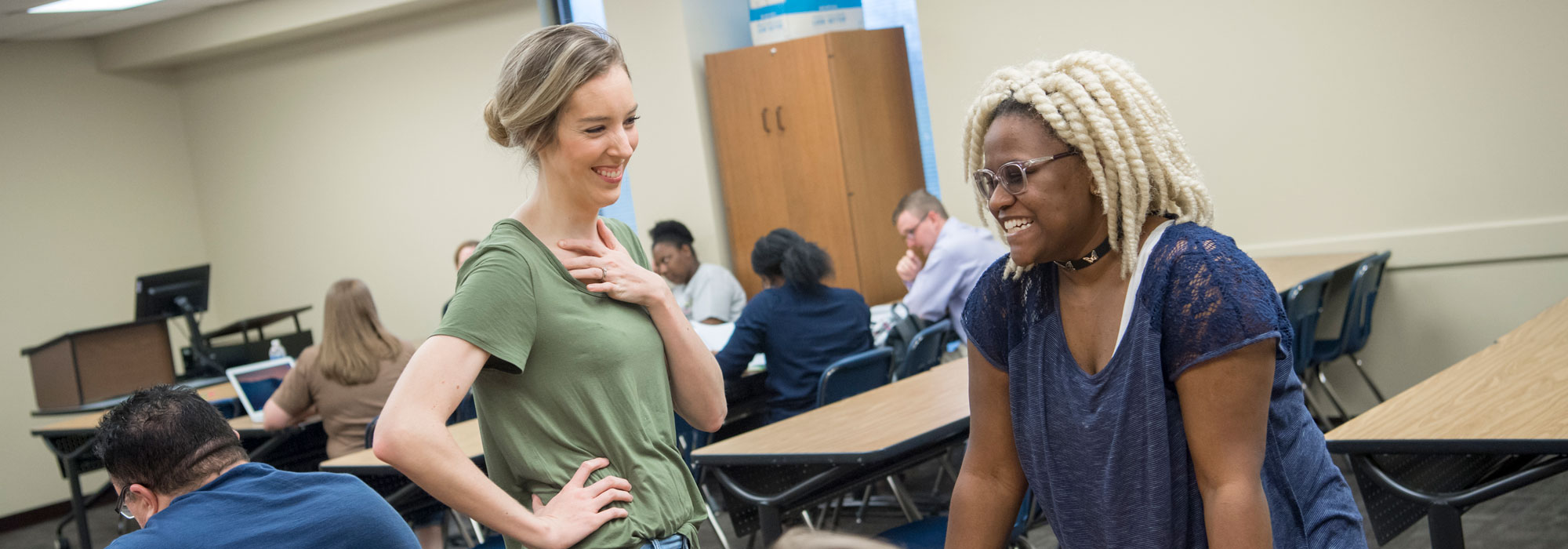Degree Requirements
Student Evaluation and Degree Requirements
To obtain the Master of Arts in Counseling degree, students must demonstrate a depth and breadth of knowledge within their chosen field, an understanding of self, and the promise of skilled performance in cognitive and affective areas. To ensure that program standards are high, students will be evaluated at the following points:
- Upon admission through a review of their writing sample, interview, academic credentials, and letters of recommendation.
- Within each course: Students are graded on academic knowledge, class participation and interpersonal skills, writing ability (both content and construct), speaking and presentation skills, independent research, professional orientation, and self-reflection and self-care. Appropriateness of classroom demeanor, behavior, and ethics is also evaluated. “A” work is considered above average performance; “B” work is considered average performance; “C” work is considered below average performance. A minimum grade point average (GPA) of 3.00, semester and cumulative, is required of all graduate students enrolled in a Master of Arts program. Students with a semester or cumulative GPA of less than 3.00 will be placed on probation. Failure to correct the deficiency in the next semester of attendance will result in dismissal.
- Upon application for candidacy: Students with a GPA of 3.00 or better must apply twice for admission to candidacy: after the completion of a minimum of 12 semester hours and a maximum of 18 semester hours and again after the completion of CNSL 6395 Practicum. The departmental graduate faculty committee evaluates each student on the student’s overall performance in courses completed to determine if the student is qualified to be a candidate to receive the Master of Arts degree. Areas evaluated by the committee include academic knowledge, class participation and interpersonal skills, writing ability (both content and construct), speaking and presentation skills, independent research, professional orientation, self-reflection and self-care, and freedom from mental health problems that would interfere with occupational functioning.
The committee may decide to accept the applicant with qualification pending completion of the first semester of practicum or reject the applicant. “Acceptance with qualification pending completion of the first semester of practicum” means that the student will make improvements in the areas that the faculty have commented on in the “candidacy letter” and will demonstrate good use of counseling knowledge, skills, and ethics in the first semester of practicum. Rejection for candidacy means that the student has consistently performed at an unacceptable level or has made few attempts to remedy deficiencies as recommended by a professor or the committee. - A student’s application for candidacy may be deferred if the committee has some question regarding the student’s appropriateness for candidacy. Acceptance for candidacy will be made by a three-fourths affirmative vote of the departmental graduate faculty committee, and rejection for or deferment of candidacy will be made by a one half negative vote of the departmental graduate faculty committee. Students will be notified in writing (“candidacy letter”) of the response to their application for candidacy and of any recommendations or requirements for improvement.
- During clinical instruction: Students must apply for and be approved to take clinical instruction classes before enrolling in these courses. Students are evaluated during Practicum and Internship by their Faculty Supervisor when working only at the Community Life Center or by their Faculty Supervisor and Site Supervisor when working at both the Community Life Center and an off-campus counseling site. All supervisors will use the Counseling Competencies Scales (CCS) to give their students evaluations at mid-term and at the end of the semester.
The Master of Arts in Counseling program is both academic and experiential. Therefore, the student must demonstrate more than cognitive abilities. Evaluation using the Counselor Competencies Scales
(CCS) will be made at various points throughout the program.
The Professional Performance Evaluation (PPE) supersedes all other requirements for a class, and no credit for the class may be earned if a “0” (does not meet criteria for program level) is indicated. A copy of the PPE and CCS can be electronically accessed at http://graduate.umhb.edu/counseling
- Following administration of comprehensive examination: Students accepted for candidacy must register for and complete a comprehensive examination conducted by the graduate counseling faculty during the students’ last semester of coursework before graduation. All comprehensive examinations cover material presented in the courses required according to the degree specialization. The comprehensive exam in the three clinical programs is a standardized written examination. The comprehensive examination in the academic specialization is a written examination constructed by three or more faculty to represent the student’s individualized degree plan. The policies and procedures for the administration and scoring of the comprehensive examination for each specialization are available through the Director of Master of Arts in Counseling program. The comprehensive exam may only be retaken once. If the examination is failed a second time, the student will no longer be eligible to receive a Master of Arts degree with a major in Counseling from UMHB.
All students in the Master of Arts in Counseling program are covered by professional liability insurance through the university. A copy of the liability policy declaration may be obtained by request from the Director of the Graduate Counseling Program.
Page last updated December 11, 2023
